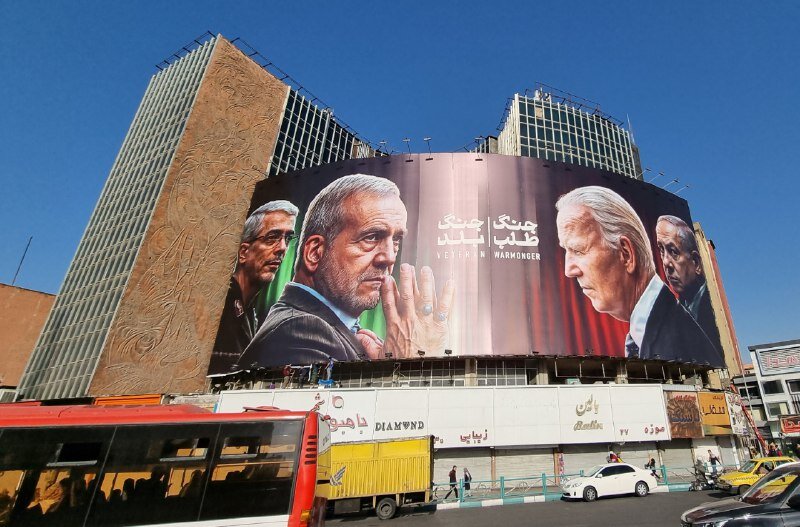United front
Iranian officials express shared stance on necessity of responding to Israel's Saturday attacks

TEHRAN – A chorus of voices has risen from Iran's leadership in the past days, with high-ranking officials from across the spectrum vowing a decisive response to the Israeli attack that targeted Iranian soil early Saturday morning.
Israeli warplanes launched long-range ballistic missile attacks on Iranian defense radars in the provinces of Tehran, Ilam, and Khuzestan. Using Iraqi airspace, the Israeli aircraft were unable to penetrate Iranian airspace after most of their attacks were repelled. While a small number of radars were damaged, which according to Iran’s defense minister have already been repaired or replaced, four Army personnel were martyred in fending off the Israeli attacks. A civilian has also been pronounced dead.
Secretary of Iran's Supreme National Security Council (SNSC) Ali Akbar Ahmadian has also declared that Israel’s recent aggression did not manage to affect Iran’s military capabilities. “This operation did not even have a minimum impact on Iran’s military power,” the security chief told reporters.
Though the Israeli attack appears to have fallen short of its original goals, experts believe that Israel did not aim to provoke a full-scale war with Iran either. “Israel's actions appear driven by a desire to bolster its reputation and prestige, yet it simultaneously seeks to avoid direct engagement with Iran,” said Mahdi Khanalizadeh, a West Asia analyst and scholar. “Tel Aviv is wary of opening a new front with Tehran while already grappling with conflicts in Gaza and Lebanon. This strategy, however, must fail. Iran’s worst response would be a lack of one.”
Leader of the Islamic Revolution Ayatollah Seyyed Ali Khamenei on Sunday called for a response that will demonstrate Iran's unwavering “power” and “resolve”. He placed the responsibility squarely on the shoulders of Iranian authorities, urging them to craft a decisive response that would leave no doubt about Iran's capabilities.
“The Zionist regime’s miscalculation should be thwarted. They (the Israelis) need to understand the power, determination, and innovation of the Iranian nation and its youth,” the Leader stated.
In the following hours, multiple high-ranking Iranian officials seemed to take heed of the Leader’s command.
The chief commander of Iran’s Islamic Revolution Guards Corps (IRGC) has said that Israel’s attack is going to have “bitter” and “unimaginable” consequences for the regime. Major General Hossein Salami further added that Israel carried out the assault out of the “frustration” it is feeling on the battlefield, where it has failed to root out Hamas or push back Hezbollah despite the depletion of its resources and the death of its forces.
General Salami spearheaded two direct strikes against Israeli positions in the occupied territories this year. The second attack, known as Operation True Promise II, saw Iran launch over 200 ballistic missiles on October 1st. Despite efforts by multiple regional and international powers to intercept them, the majority of the missiles successfully hit their targets. The first attack took place 6 months prior, involving hundreds of Iranian drones and missiles with significantly older technologies than the ones used against Israel in October. Iran says its arsenal boasts more advanced weaponry than what has been publicly displayed in past operations.
In similar remarks, Iran's Judiciary Chief Gholamhossein Mohseni-Ejei said during a meeting with his subordinates that Tehran should make Israel pay for its Saturday attack. Foreign Minister Abbas Araghchi and Parliament Speaker Mohammad Baqer Qalibaf have also vowed that Iran will make Israel realize that no limit of aggression against the country will be tolerated.
How Iran will directly be responding to Israel for a third time remains a mystery.
“The enemy has grown bold due to a flawed assessment of our strategies and power. This audacity stems from the erroneous perception we have inadvertently created,” explained Ali Abdi, an Iranian expert on Israel. “To counter this, we must shatter their perception of us. We need to disrupt their calculations and demonstrate that their assumptions are incorrect. Only then can we take the first step towards disciplining them.”
The expert emphasized that establishing a new order against Israel will require a multifaceted approach, combining military strength with diplomatic and media campaigns.
